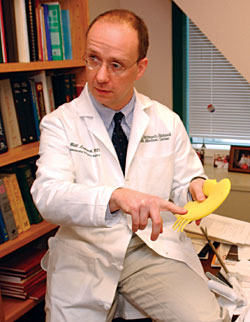Bariatric surgery can increase life expectancy
"There has to be an end to the madness," Lisa Driscoll-Rodiman told herself as her weight crept up to 380 pounds. There was. Gastric bypass surgery. It did for her what years of dieting had failed to do—helped her to shed more than 200 pounds.

|
|
Bill Laycock, head of bariatric surgery,
points to a model of the stomach.
|
Staples: DHMC bariatric surgeons performed what is known as a Roux-en-Y gastric bypass on Driscoll-Rodiman in June 2001. They opened her up; inserted surgical staples across the top of her stomach, leaving a pouch hardly bigger than an egg; and connected it directly to her intestine. She says that now when she overeats, "It hurts!"
Today, about 25% of adult Americans are obese, with 3% considered morbidly obese—at least 100 pounds overweight. And it's estimated that the obesity rate could reach 40% within five years. Meanwhile, gastric bypass surgery, also known as bariatric surgery, has been gaining in popularity. About 40,000 bariatric procedures were performed in the U.S. in 2000, and it's expected that over 100,000 will be done this year.
A recent DMS study, presented at the American College of Surgeons' Clinical Congress, has shown that such surgery can significantly increase life expectancy. John Birkmeyer, M.D., chief of general surgery, was a coauthor of the study, which concluded that bariatric surgery can add three years to a patient's life. He points out that other procedures, like coronary angioplasty and coronary bypass surgery, "produce life expectancy benefits measured in months—3 to 12—substantially lower than gastric bypass."
Demand: As a result, demand for the surgery is increasing so rapidly that hospitals nationwide are struggling to meet it. At DHMC, it can be over a year from the time a patient makes initial contact with the program until surgery is done.
Everyone on DHMC's bariatric surgery team—which includes four surgeons, a nurse practitioner, a nurse, and a fulltime dietician—is quick to note that bariatric surgery is only a tool to help people like Driscoll- Rodiman jump-start a weightloss program.
Patients also need to make lifelong lifestyle changes, drastically modify their eating behavior, and engage in regular exercise. Otherwise the weight can come right back. Before patients are even considered for surgery, they must get a physical exam from their primary-care physician, attend three gastric bypass support-group meetings, be evaluated by the team, lose at least 15 pounds, undergo a psychiatric evaluation, and make a commitment to maintain contact with the program after surgery.
The operation, which can be done laparoscopically in some patients, helps to reduce many of the health problems associated with obesity, such as diabetes, heart disease, high blood pressure, stroke, certain cancers, depression, and osteoarthritis. But the surgery is not without risk. The most common complications are pulmonary embolism, respiratory failure, and gastrointestinal leaks, which can cause serious infections. And, as with any surgery, there is a chance of dying. But "the risks of surgery are relatively low," says Birkmeyer. "Mortality is considerably lower than one percent."
Success rates were lower in decades past, however. In the 1970s, the most common operation to treat obesity involved shortening the intestine so less food would be absorbed, explains Kenneth Burchard, M.D., who recently stepped down after 12 years as director of DHMC's bariatric surgery program. "The procedure was abandoned by the early 1980s," he adds, "because of acute illnesses, especially acute liver malfunction, that threatened life."
Better: Today, with better procedures, Birkmeyer says bariatric surgery is also "providing a human model for the investigation of the underlying pathophysiology of obesity." He predicts that "the surgery may advance the understanding of this illness" so a nonsurgical treatment may one day be possible.
In addition, DHMC will soon be testing a new way to perform gastric bypass surgery, explains William Laycock, M.D., the current director of the bariatric surgery program.
Dartmouth-Hitchcock is one of 12 medical centers that will be participating in clinical trials of a device called the Swedish adjustable gastric band (SAGB). Such devices, which are placed laparoscopically, have been used widely in Europe for several years. The SAGB is an inflatable band that is fitted around the uppermost part of the stomach, creating a small pouch. The physician can adjust the band's diameter by injecting or removing fluid according to the patient's weight-loss requirements.
Benefits: The benefits of gastric bypass surgery can be significant. "I feel like a normal person again," says Driscoll-Rodiman. "I can ride a bike. I can ride a swing, run with my kids, wear normal clothes. I can even cross my legs. Little things that people take for granted."
Laura Stephenson Carter
If you would like to offer any feedback about this article, we would welcome getting your comments at DartMed@Dartmouth.edu.
